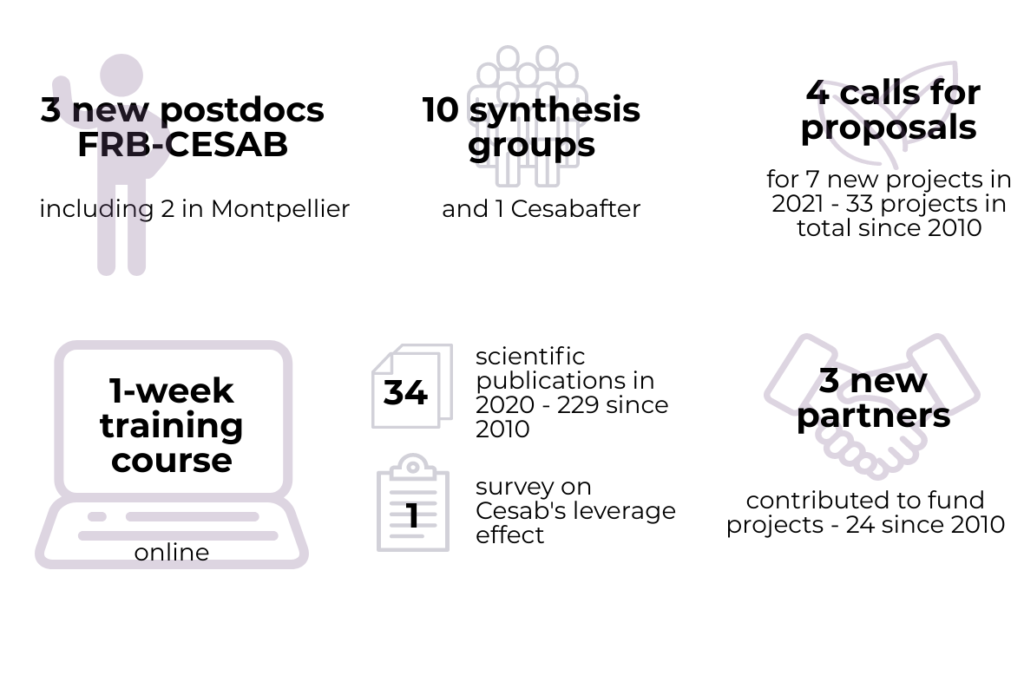[FRB-CESAB] Newsletter 4 CESAB – January 2021
The FRB’s Center for Biodiversity Synthesis and Analysis (CESAB) is a research structure with an international scope whose objective is to implement innovative work on the synthesis and analysis of existing data sets in the field of biodiversity. Twice a year, the CESAB publishes a newsletter listing the different news and activities going on.
A WORD FROM THE NEW FRB’S PRESIDENT: DENIS COUVET

Denis Couvet
The French Foundation for Biodiversity Research’s ambition is to better understand the dynamics of biodiversity, in interaction with those of societies. Its vocation is to build, with all actors, public and private, civil society, approaches based on nature and therefore biodiversity. Another main concern is to know how to anticipate the impacts, opportunities and unexpected effects… of these approaches, in an integrative and systemic framework. The synthesis center created by the FRB, CESAB, is a tool of excellence to meet these different objectives.
See FRB-CESAB job opportunities

- Postdoc news

Simon Brandl

Jérémy Carlot

Ali Ben Abbes
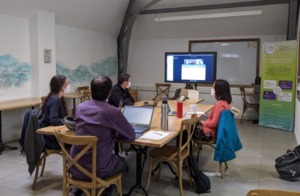
This course was part of a series of workshops organized within the framework of the research infrastructure “National hub for biodiversity data” (in French PNDB: Pôle National des Données de Biodiversité), to make data FAIR – Findable, Accessible, Interoperable and Reusable.
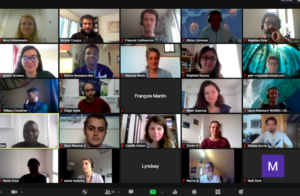
A few participants during the 2020 online training course
The CESAB and the GDR EcoStat organized the second edition of this training course. 23 students, engineers and researchers from all over France were able to attend this training course online and to learn about reproductibility, software development and version management tools (e.g. R, git, markdown, tidyverse, docker), applied to biodiversity research.
Three training courses are currently planned for 2021: two with the GDR Ecostat and the GDR TheomoDive, and one on systematic reviews.

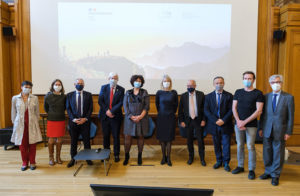
© Geoffroy Lasne
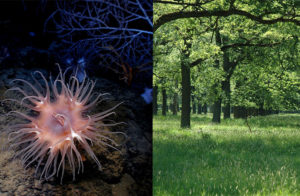
- Theme 1: State and future of marine biodiversity in a time of global change
- Theme 2, in partnership with Agropolis Fondation: Solutions for agro-ecological transition that conserve biodiversity
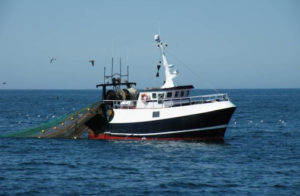

Despite the health situation, which prevents researchers from meeting in-person at CESAB in Montpellier, the groups remain active and work remotely (see news article about FREE and RED-BIO meetings). These virtual meetings ensure the continuation of the projects’ work and several scientific articles have been published in the last few months, some of them in high impact journals as Nature Communication, Global Change Biology,…
Ballesteros Mejia L, Arnal P, Hallwachs W, Haxaire J, Janzen D, Kitching IJ & Rougerie R (2020) A global food plant dataset for wild silkmoths and hawkmoths and its use in documenting polyphagy of their caterpillars (Lepidoptera: Bombycoidea: Saturniidae, Sphingidae). Biodiversity Data Journal, 8, e60027. doi: 10.3897/BDJ.8.e60027.
Bourgeois B, Gaba S, Plumejeaud C & Bretagnolle V (2020) Weed diversity is driven by complex interplay between multi-scale dispersal and local filtering. Proceedings of the Royal Society B: Biological Sciences, 287, 20201118. doi: 10.1098/rspb.2020.1118.
Fried G, Armengot L, Storkey J, Bourgeois B, Gaba S, Violle C & Munoz F (2020) Do ecological specialization and functional traits explain the abundance-frequency relationship? Arable weeds as a case study. Journal of Biogeography, accepted. doi: 10.1111/jbi.13980.
Gaba S, Cheviron N, Perrot T, Piutti S, Gautier J-L & Bretagnolle V (2020) Weeds enhance multifunctionality in arable lands in South-West of France. Frontiers in Sustainable Food Systems, 4, 71. doi: 10.3389/fsufs.2020.00071.
Denelle P, Violle C & Munoz F (2020) Generalist plants are more competitive and more functionally similar to each other than specialist plants: insights from network analyses. Journal of Biogeography, 47, 1922–1933. doi: 10.1111/jbi.13848.
Grenié M, Violle C & Munoz F (2020) Is prediction of species richness from stacked species distribution models biased by habitat saturation? Ecological Indicators, 111, 105970. doi: 10.1016/j.ecolind.2019.105970.
Laroche F, Violle C, Taudière A & Munoz F (2020) Analyzing snapshot diversity patterns with the Neutral Theory can show functional groups’ effects on community assembly. Ecology, 101, e02977. doi: 10.1002/ecy.2977.
Loiseau N, Mouquet N, Casajus N, Grenié M, Guéguen M, Maitner B, Mouillot D, Ostling A, Renaud J, Tucker C, Velez L, Thuiller W & Violle C (2020) Global distribution and conservation status of ecologically rare mammal and bird species. Nature Communications, 11, 5071. doi: 10.1038/s41467-020-18779-w.
Mahaut L, Fort F, Violle C & Freschet GT (2020) Multiple facets of diversity effects on plant productivity: Species richness, functional diversity, species identity and intraspecific competition. Functional Ecology, 34, 287–298. doi: 10.1111/1365-2435.13473.
Bonhomme C, Céréghino R, Carrias J-F, Compin A, Corbara B, Jassey V, Leflaive J, Farjalla VF, Marino NAC, Rota T, Srivastava DS & Leroy C (2020) In situ resistance, not immigration, supports invertebrate community resilience to drought intensification in a neotropical ecosystem. Journal of Animal Ecology, accepted. doi: 10.1111/1365-2656.13392.
Céréghino R, Françoise L, Bonhomme C, Carrias J-F, Compin A, Corbara B, Jassey V, Leflaive J, Rota T, Farjalla VF & Leroy C (2020) Desiccation resistance traits predict freshwater invertebrate survival and community response to drought scenarios in a Neotropical ecosystem. Ecological Indicators, 119, 106839. doi: 10.1016/j.ecolind.2020.106839.
Guzman LM, Trzcinski MK, Barberis IM, Céréghino R, Srivastava DS, Gilbert B, Pillar VD, de Omena PM, MacDonald AAM, Corbara B, Leroy C, Ospina Bautista F, Romero GQ, Kratina K, Debastiani VJ, Gonçalves AZ, Farjalla VF, Richardson BA, Richardson MJ, Dézerald O, Petermann J, Talaga S, Piccoli GCO, Jocqué M & Montero G (2020) Climate influences the response of community functional traits to local conditions in bromeliad invertebrate communities. Ecography, accepted. doi: 10.1111/ecog.05437.
Chang CW, Ye H, Miki T, Deyle ER, Souissi S, Anneville O, Adrian R, Chiang Y-R, Ichise S, Kumagai M, Matsuzaki SS, Shiah F-K, Wu J-T, hao Hsieh C & Sugihara G (2020) Long-term warming destabilizes aquatic ecosystems through weakening biodiversity-mediated causal networks. Global Change Biology, 26, 6413–6423. doi: 10.1111/gcb.15323.
David R, Mabile L, Specht A, Stryeck S, Thomsen M, Yahia M, Jonquet C, Dollé L, Jacob D, Bailo D, Bravo E, Gachet S, Gunderman H, Hollebecq J-E, Ioannidis V, Le Bras Y, Lerigoleur E & Cambon-Thomsen A (2020) FAIRness Literacy: The Achilles’ Heel of Applying FAIR Principles. Data Science Journal, 19, 32. doi: 10.5334/dsj-2020-032.
Jarry R, Chaumont M, Berti-Équille L & Subsol G (2020) Assessment of CNN-based methods for poverty estimation from satellite images. Proceeding of the 25th International Conference on Pattern Recognition, ICPR’2021, 11th IAPR International Workshop on Pattern Recognition in Remote Sensing, PRRS’2021, 15p.
Specht A, Corrêa P, Belbin L & Loescher HW (2020) Critical research infrastructure: The importance of synthesis centers. Elephant in the Lab. doi: 10.5281/zenodo.3660920.
Brandl SJ, Johansen JL, Casey JM, Tornabene L, Morais RA & Burt JA (2020) Extreme environmental conditions reduce coral reef fish biodiversity and productivity. Nature Communications, 11, 3832. doi: 10.1038/s41467-020-17731-2.
Parravicini V, Casey JM, Schiettekatte NMD, Brandl SJ, Pozas-Schacre C, Carlot J, Edgar GJ, Graham NAJ, Harmelin-Vivien M, Kulbicki M, Strona G & Stuart-Smith RD (2020) Delineating reef fish trophic guilds with global gut content data synthesis and phylogeny. PLoS Biology, 18, e3000702. doi: 10.1371/journal.pbio.3000702.
Helmstetter AJ, Amoussou BEN, Bethune K, Kamdem NG, Glèlè Kakaï R, Sonké B & Couvreur TLP (2020) Phylogenomic approaches reveal how climate shapes patterns of genetic diversity in an African rain forest tree species. Molecular Ecology, 29, 3560–3573. doi: 10.1111/mec.15572.
Helmstetter AJ, Béthune K, Kamdem NG, Sonké B & Couvreur TL (2020) Individualistic evolutionary responses of Central African rain forest plants to Pleistocene climatic fluctuations. Proceedings of the National Academy of Sciences of the United States of America, 117, 32509–32518. doi: 10.1073/pnas.2001018117.
Helmstetter AJ, Kamga SM, Bethune K, Lautenschläger T, Zizka A, Bacon CD, Wieringa JJ, Stauffer F, Antonelli A, Sonké B & Couvreur TLP (2020) Unraveling the phylogenomic relationships of the most diverse African palm genus Raphia (Calamoideae, Arecaceae). Plants, 9, 549. doi: 10.3390/plants9040549.
Helmstetter AJ, Papadopulos AST, Igea J & Van Dooren TJM (2020) Trait evolution and historical biogeography shape assemblages of annual killifish. Journal of Biogeography, 47, 1955–1965. doi: 10.1111/jbi.13912.
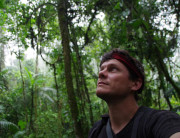
Thomas Couvreur, PI for the project RAINBIO from 2014 to 2017
“RAINBIO was the first large project I had to manage, only three years after entering the IRD (Research Institute for Development) and was fundamental to my career development. Leading such a large group of international researchers was challenging but gave me a lot of experience. I really enjoyed being the PI and we had a lot of fun. The group was solid and the relationships were always very good, even today we continue our tight collaboration in different projects. I look back with nostalgia on the RAINBIO days, the meetings and the dinners in Aix en Provence (CESAB’s first location before moving to Montpellier in January 2019)!
